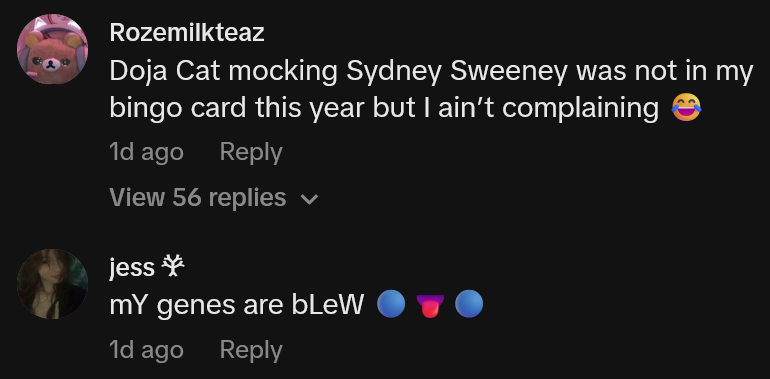Recording artist Doja Cat recently ignited a fresh wave of discourse with a viral TikTok video where she satirically mimicked a controversial American Eagle advertisement featuring actress Sydney Sweeney. The video, which quickly garnered millions of views, saw Doja Cat reciting the ad’s dialogue in an exaggerated Southern drawl, a performance that resonated positively with many of her fans and critics of the clothing brand’s campaign.
The American Eagle “good jeans” campaign drew significant public scrutiny for its unfortunate choice of language, which inadvertently echoed eugenicist rhetoric. The advertisement’s central phrase, “Genes are passed down from parents to offspring, often determining traits like hair colour, personality, and even eye color. My jeans are blue,” when pronounced as “blee,” attempted a clever fabric pun. However, observers widely condemned the timing and context of using terminology associated with “good genes,” especially when linked to physical attributes like hair and eye color.
For Doja Cat, a Black South African woman, the subtext of the advertisement presented a particularly poignant point of contention, providing a clear rationale for her public jest. Her TikTok critique served not only as a comedic performance but also as an indirect commentary on the insensitivity of the campaign’s messaging, especially given its historical and social implications.
On platforms like TikTok, the video was largely met with enthusiastic approval from her followers, who expressed joy at seeing Doja Cat’s return to her characteristic bold and quirky public persona. Many fans noted the unexpected nature of her return to the spotlight, humorously remarking that her involvement in the “Sydney Sweeney jeans ad controversy” was “not on my bingo card” for the year, underscoring the spontaneous and viral nature of the moment.
However, the narrative shifted dramatically on platforms such as X, where the viral success of her TikTok was overshadowed by renewed attention to Doja Cat’s own history of controversies. Commenters swiftly brought up past instances where her public image was scrutinized for perceived associations with problematic figures and ideologies, effectively turning the spotlight back onto her.
Among the most frequently cited incidents was her 2023 controversy, where she faced considerable backlash for posting photos wearing a shirt featuring alt-right comedian Sam Hyde. Despite her subsequent apology, where she claimed ignorance of Hyde’s identity, the incident left a lingering impression on a segment of her audience, who felt her apology was insufficient given the context.
Further complicating her public image were older controversies, including lyrics from her 2015 song “Dindu Nuffin” and circulating footage of her engaging in sexually explicit conversations within TinyChat groups associated with alt-right and incel communities. These past events, for which she also issued apologies, were resurfaced by critics who drew parallels between her current critique and her own historical missteps, questioning the sincerity of her stance.
The contrasting reactions on different social media platforms underscore the complex interplay of contemporary social commentary and internet memory. While Doja Cat successfully leveraged her comedic talent to lampoon a contentious advertisement, the swift public recall of her own past controversies highlighted the unforgiving nature of the digital sphere, where an artist’s previous actions can quickly re-emerge to challenge their present narratives, creating a perception of “two sides of the same coin.”






Leave a Reply